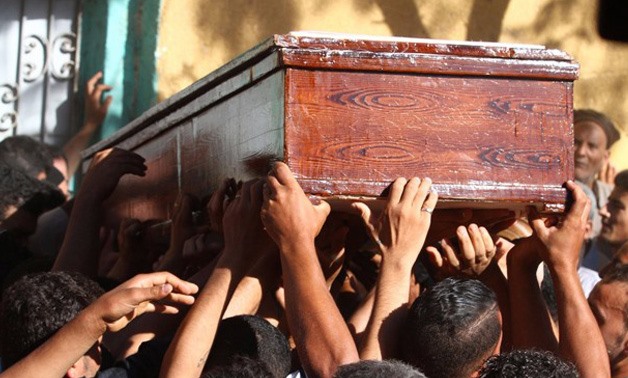
The bus carrying more than 50 Copts was intercepted by gunmen in three SUVs – Hussein Tallal
CAIRO – 30 May 2017: Eric Trager, an expert on Egyptian politics and the outlawed Muslim Brotherhood group, argues that the Brotherhood is not responsible for terror attacks on Egyptian Christians but “it’s certainly fanning the flames of hatred.”
In his article on Foreign Policy Saturday titled “The Cynical Conspiracy War on Egypt’s Christians,” Trager highlighted statements by members and supporters of the outlawed Islamist group justifying the attacks on Christians.
Trager cited the statements of Ahmed el-Moghir, aMuslim Brotherhood figure, and Ayat Orabi, an Islamist based in New York, declaring that Christians are paying a hefty price for “allying” with the state in overthrowing the Islamist regime in 2013. They claimed that the state is trying to stage a superficial oppression of Christians to achieve political gains on the international scale.
Following a deadly shooting at a bus carrying Copts on Friday, Moghir, who fled the country as he received sentences in absentia over terrorism charges, said in a controversial post on Facebook that Christians have to stop supporting the current regime and seek “reconciliation with Muslims, or their blood will be shed like rivers and no one will care about them.” He added that President Abdel Fatah al-Sisi is attempting to turn Egypt into either a “Christian or an atheist state.”
Amr Farrag, a youth Muslim Brotherhood figure based in Turkey, propagated in his tweets after Palm Sunday attacks that Pope Tawadros II had a prior knowledge of the bombings and left the Cathedral of Alexandria beforehand. Furthermore, other Muslim Brotherhood figures tweeted photos of Christian clerics passing by military tanks securing Pope Francis during his visit on April 26, calling Egyptian army the ‘church militia.’
The article included the analysis of Mokhtar Awad, a research fellow in the Program on Extremism at George Washington University, that the Islamic State (IS) terrorist group is carrying out those terror attacks on Christians to ignite unrest, which was the same strategy undertaken against Shiite in Iraq to achieve the same goal.
Trager concluded by saying that sectarian incitement perpetuated by the Brotherhood aims to discourage Muslims from protecting Christians as much as terror attacks assumed by IS aims to achieve the same goal through massive fatal attacks.
That last conclusion implies that psychological terrorism and motivating people to not protect citizens of the same country is not considered terrorism, as long as it is not inflicting direct physical harm. That reflects a radical dichotomy between Egypt represented in the state and the people, and some other countries, entities, and individuals in the perception of Islamists, especially the Brotherhood.
Trager’s argument of dissociating the crime of terrorism from the Brotherhood and restricting its statements to opposition and hate speech disregards the massacres committed by the group in Rabaa El Adaweya and Nahda sit-ins, and their threats of terror attacks on their opponents and operations on the borders in Sinai.
As the Brotherhood consider Christians their enemies, they managed to target them during the political momentum that took place before after the June 30 revolution in 2013 that toppled former Islamist president Mohamed Morsi who took office in 2012.
In parallel to the rise of Islamists’ power, the Cathedral was attacked in April, 2013, followed by a shooting on a wedding in a Church in Waraq, a poor neighborhood in Cairo. In the few months following the ousting of Morsi, the group executed 64 attacks on churches and convents in different governorates.
That argument reflects the misunderstanding of the school of thought of the Brotherhood that focuses on boosting the self-esteem of some by making them believe they are superior to other citizens in the same country just because they belong to a certain faith.
That notion expands to include followers of the same religion who do not adopt the same extremist ideology regarding different aspects of life and thinking.
Those beliefs become the basis for further extremist, mostly violent, acts against the different Other. Ayman el-Zawahry, the current Qaeda leader, is an epitome of such fact. Zawahry was recruited by the Brotherhood when he was a student at medical school in the 1970s before he joined other terrorist groups before being a Qaeda member.
The notion that the Brotherhood members are innocent from terror attacks happening in Egypt implies turning a blind eye to the violence and vandalism conducted by the group, and to the fact that acts of aggression can be easily instigated through hate speech.

Comments
Leave a Comment